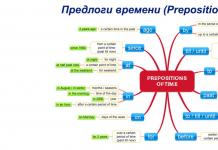The preposition after is used for:
Time designations (meaning “after”):
After we finish packing the furniture it must be loaded on the truck.
After we finish packing the furniture, it will need to be loaded onto a truck.
Place designations (meaning “following, after”):
Don't run, the dogs will run After us.
Don't run, otherwise the dogs will run after us.
The before preposition can be used to:
Time designations (meaning “before, before”):
I will try to return home Before 6.
I'll try to get home before six.
You must tell me a tale Before I go to sleep.
Before I go to bed, you must tell me a story.
Place designations (meaning “before”):
You keep stopping before each shop window.
You always stop in front of every shop window.
- As you know, the ellipsis is a punctuation mark, outwardly representing a combination of three dots (...). The ellipsis is rarely used in English. As Lynn Truss writes...
- “Practical English Grammar” Lesson #7: Present perfect tense (Part 1) “I have done” Part #1: Consider an example situation: Tom is looking for his key. He can't find...
- Personal pronouns Table of personal pronouns in the nominative case Person Examples Singular 1st I (I) I am looking at the picture (I look at the picture) 2nd - - 3rd He ...
- Present continuous “I am doing” Answers to exercise 1.5: 1. ‘s getting, is getting 2. is changing 3. is rising or is increasing 4. ‘s getting, is getting...
- The inclination shows how the speaker views the action in relation to reality. The imperative mood reflects the will of the speaker, the motivation to perform an action, a request or an order: Go to the lake. Go to the lake. Usage...
- A numeral is a part of speech that denotes the number or order of things. Accordingly, English numerals are divided into two groups: quantitative (cardinal numerals) and ordinal (ordinal numerals). Quantitative numbers indicate the number of objects (they answer ...
- Short forms I'm, you've, didn't: In colloquial English we use I'm, you've, didn't etc. (short form) and not I am, you have, did not etc. We also use...
- Formation Complex Object Subject Predicate Object (nominative noun or object pronoun) Infinitive (or participle I) We Waited for Them To begin the conversation. Complex Object We...
- Meaning of May/Might (past form of May) Definition: Expressing possibility Meaning: Expressing possibility Examples That may be true. I may go to Ireland - I...
- Pronunciation is the biggest difference. Students with English proficiency often encounter a characteristic difficulty in their first contact with Americans. The problem, however, is not even in the language, but...
- The meaning of the verb To be is “to be, to be”. Unlike other English verbs, the verb to be is conjugated (i.e., changes in persons and numbers). Forms of the verb to be I am...
- In an unstressed position, the vowels “e”, “i”, “y” usually convey the sound [I], unless they are followed by a consonant letter “r”: Prefer - (Prefer) Divide ...
- Imperative sentences express an inducement to a certain action, a request, an order, and in a negative form - a prohibition. The imperative sentence in English has the usual, direct word order, but begins with a verb, and ...
- English and Russian grammar have both similarities and differences. For example, the degrees of comparison of adjectives have the same properties in both Russian and English, and articles are something unknown to ...
- Reciprocal pronouns in English include the following pronouns: each other, one another Reciprocal pronouns describe the relationship between two or more persons or, more rarely, objects. According to the rules of traditional grammar, the pronoun ...
- Basically, the punctuation of English and Russian is the same, usually only the use of an apostrophe and a comma causes difficulty. A period, question mark, and exclamation mark are placed at the end of sentences. Also, a dot is placed after the abbreviations ...
- Before looking at the examples, let's first recall the definition of common questions. General questions are asked to the interlocutor in order to obtain confirmation or denial of the entire thought expressed in the question and, thus, ...
- Present continuous and present simple (part 1) “I am doing and I do” Answers to exercise 3.2: 1. ‘s waiting, is waiting 2. Are you listening 3. Do you listen...
- 10 simple English sentences (with translation) This soup is very tasty - This soup is very tasty. They are our neighbors - They are our neighbors. I am going to travel round...
- Meaning of the verb Can/Could (past form of the verb Can) Definition: Be able to Meaning: To be able to (do something) Examples (examples) They can run fast - They can run fast. Can...
The words before/after act as prepositions when placed before a noun that has a tense context.
Tom often watches TV after 11 o'clock. Tom often watches TV after 11 o'clock.
Our team practiced a lot before the game. Our team practiced a lot before the game.
As conjunctions, they form a temporary clause in complex sentences. Please note that we put a comma in cases where the explanatory part is before the main one.
Jonathan forgot his keys before he left. Jonathan forgot his keys before he left.
After I finished my dinner, I went to bed. I went to bed after I had supper.
We can also use conjunctions before/after together with the gerund, replacing the subject and predicate in the subordinate clause.
Jonathan forgot his keys before leaving. Jonathan forgot his keys before leaving.
After finishing my dinner, I went to bed. After dinner I went to bed.
2
Both words define the period during which an event occurs. Wherein during always comes before a noun while before the verb form. Compare:
George told us an amazing story during breakfast ( Not properly: while breakfast). George told us an amazing story during breakfast.
George told us an amazing story while we were having breakfast. George told us an amazing story while we were having breakfast.
Try not to confuse prepositions during and for. The first tells us when the event occurs, the second tells us how long it lasts.
I was ill during January (= in January). I got sick in January.
I was ill for a month Not properly: during a month). I have been sick for a month.
3
If the context of a complex sentence refers to the future, then its subordinate part goes in the present tense. This rule is true for all temporary unions ( after/before/while/until/when etc.).
I'll phone you after I come ( Not properly: after I'll come). I'll call you after I arrive.
Don't forget your keys before you go out. Don't forget your keys before you leave the house.
Oliver is going to visit his friends in Ireland while he is there. Oliver is going to visit his friends in Ireland while he is there.
Adverbs that are included in the circumstance of place, direction and time may coincide in form and meaning with prepositions. We have already considered several such adverbs and prepositions, now another preposition is next in line - “after”.
AFTER
I. AS A PREPOSITION.
1. The preposition “after” with the meaning: behind, after, behind, after; in this sense, the preposition "after" is a preposition of place and direction. The antonym of the preposition "after" is the preposition "before". The preposition “after” shows the location behind some object or the movement behind some moving object. If you think about it, the order (movements or locations) is clearly visible here, and the preposition “after” expresses a sequence of actions or positions in space.
For example:
Shut the door after you leave the room. = Close the door behind you when you leave the room.
The dog was running after his master. = The dog ran after the owner.
He entered the room after his father. = He entered the room after his father.
They left the room one after the other. = They left the room one by one.
Your name comes after mine in the list. = Your last name is on the list behind mine.
2. The preposition “after” with the meaning: for, through, after, after; in this sense, the preposition “after” is a preposition of time and indicates a sequence of actions, but in terms of time, or indicates a period of time after which the action will occur. The antonym of the preposition "after" is the preposition "before".
For example:
We are leaving after breakfast. = We will leave after breakfast.
They met after five years. = They met after five years.
He arrived after me. = He came after me.
The children never go out after dark. = Children never go out for a walk after it gets dark.
He is coming after two o'clock. = He will come after two o'clock.
3. The preposition “after” with the meaning: by, with, according to; in this sense, the preposition “after” indicates similarity or imitation in style, fashion, behavior, manner, etc.
For example:
The boy was named after his grandfather. = The boy was named after his grandfather.
Henry takes after his father. = Henry is like his father (in character).
after the latest fashion = according to the latest fashion;
after the same pattern = following the same pattern;
II. AS AN ADVERB.
1. The adverb “after” with the meaning: behind, behind; the adverb “after” in this sense is an adverb of place and direction.
He came up to me and stood after. = He came up to me and stood behind me.
I saw John walking along the road. His dog was running after. = I saw John walking along the road. His dog was running behind.
2. The adverb “after” with the meaning: then, then, subsequently, later; in this sense, the adverb “after” is an adverb of time.
What happened after? = What happened then?
Henry arrived last Wednesday, I came the day after. = Henry arrived last Wednesday, and I arrived a day later.
Compound sentences that have a main and subordinate parts are divided into several types depending on the type of the subordinate clause. In the last lesson, we considered a sentence with a subordinate clause. In this lesson, we will consider complex sentences with clauses of time, in which the clause is a detailed adverb of time. These sentences use conjunctions when– when, while– while, before– before,after– after.
- Let's agree on action A and action B.
- Sentences with conjunctions when and while: I will call you when you are ready.
- Compound sentences with before and after.
- Exercises.
- Dictionary.
Let's agree on action A and action B
The meaning of a sentence with a clause of time is somewhat different depending on the time of the main clause and the clause. For convenience, let's agree: below I will call the main action (what is in the main part) action A, secondary (in the subordinate) - action B.
Once again: the main thing, in the main sentence - action A, complementary, in the subordinate clause - action B.
Sentences with conjunctions when and while: I will call you when you are ready
First, consider sentences with conjunctions when – when and while – while.
Union proposals when differ in a variety of meanings depending on the time of the main and subordinate clauses. It is not difficult to remember these meanings, if not just by cramming them, but by understanding that they stem from the meanings of certain tense forms of the verb.
For example, the Present Simple tense expresses an ordinary, regular action, so it is not surprising that a sentence where both parts are in this tense expresses a pattern: one action regularly occurs when another action occurs.
The Past Continuous expresses a long action in the past, so it is not surprising that if both parts of the sentence are in the Past Continuous, in general it refers to two actions that took place at the same time.
Consider several options for proposals with when.
- Both parts in Present Simple - a pattern
If in both parts of the sentence the verb is in the Present Simple form, the meaning of the sentence is: A happens when B happens. That is, we are talking about a general pattern.
People drink more water when it is hot. People drink more water when it's hot.
Note that in sentences with a clause of tense, the clause may come before the main clause. In this case, a comma is placed after it.
When people get tired, they need some rest. When people get tired, they need rest.
- Main part in Future Simple, subordinate clause in Present Simple.
The meaning of the sentence is: A will happen when B happens.
Important point: in English, the subordinate tense is used in the present tense (underlined in the example), and not in the future, as in Russian.
I will help you when you are ready. - I'll help you when you're ready.
When you come back, I will talk to you. "When you get back, I'll talk to you."
A common mistake is to put both verbs in the future tense, as in Russian:
Correctly: I will help you when you are ready
Not properly: I will help you when you will be ready. I will help you when you are ready.
In other words, in a complex sentence with a subordinate tense, both parts cannot be in the future tense. Only the main part is put in the future tense, and the subordinate clause is put in the present. This rule applies not only to sentences with a union when, but also to sentences where the subordinate tense is joined by other unions.
- Both parts in Past Simple - first one, then the other
The meaning of the sentence: 1) A happened after B happened, 2) A happened at the same time as B.
My dog came back home when the rain started. My dog came home when it started to rain.
When I fell down, a police officer came to help me. When I fell, a policeman came to help.
First it started to rain, then the dog returned home. First I fell, then a policeman came up. However, these sentences can be understood differently: it started to rain, and at that moment the dog returned, I fell, and at that time a policeman came up.
note: word home can be used not only as a noun “house”, but also as an adverb “home”, “at home”. In this case, there is no need for a preposition before it. For example:
Honey, I'm home.- Dear, I at home.
Let's go home.- Let's go home.
There are times when home can be used both as a noun (with a preposition) and as an adverb without a difference in meaning:
I will stay at home. - I will stay at home (literally: in the house).
I will stay home.- I'll stay at home.
- Main part in Past Simple, subordinate clause in Past Continuous
A happened at the time it happened (did not happen, namely it happened) B.
I came in when he was sleeping. I came in while he was sleeping.
When I was walking, John called me. When I was walking, John called me.
In other words, there was a long process expressed in Past Continuous (I was walking), then during this process a one-time action took place, expressed in Past Simple (John called me).
- Both parts are in Past Continuous
A and B happened at the same time.
I was sleeping when you were watching TV. - I was sleeping when (while) you were watching TV.
In this case, the union is often used while – while, at the same time as. He is more than when emphasizes the simultaneity of the course of actions.
I was sleeping while you were watching TV. I was sleeping while you were watching TV.
Complex sentences with before and after
Now consider sentences with conjunctions before, after.
As in the proposals when, the general meaning of the sentence depends on the tense form in which the verb is used in the main part and the subordinate clause. It is important not to mechanically memorize schemes like “the main part in such a tense, the subordinate clause in such”, but to understand that the meaning of a complex sentence stems from the meaning of simple + the meaning of the union. For example, if in both parts of Present Simple, the sentence will express a pattern:
star rise after the sun sets. - The stars are rising after that as the sun goes down.
Theoretically, in sentences with before and after different combinations of tenses are possible in the main part and the subordinate clause, but in practice the following are usually found:
- Main part in Future Simple, subordinate clause in Present Simple
Remember, if the main clause is in the future tense, the subordinate clause is in the present. I remind you that this rule applies in general to all complex sentences with a clause of time.
I will find you before you leave. “I will find you before you leave.
I will find you after you leave. “I will find you after you leave.
- Both parts are in Past Simple.
One action happened before/after another.
I found you before you left. “I found you before you left.
I found you after you left. “I found you after you left.
By the way, in English there is a special tense form for the “before last” action, that is, an action that happened before another action in the past. To make an action in the Past Simple “before the last”, you need to add “had” in front of it:
I had found you before you left. “I found you before you left.
But, firstly, the “before the past” action is used if the interval between actions is long enough, that is, the actions did not occur immediately after each other, and secondly, in colloquial speech, they are often neglected. We will return to the “before last” action.
I remember the words before and after can act not only as unions connecting parts of a complex sentence. They can also act as prepositions in a simple sentence. In this case, the combination “preposition + noun” forms a circumstance in a simple sentence.
For example:
I found you before the lesson. - I found you before class.
She left after the interview. She left after the interview.
Exercises
Complete the exercise on the use of complex sentences with a clause of tense. You need to choose one correct answer.
Dictionary
Verb to get(in the past tense - got) - one of the leaders in the use in colloquial speech. You can meet it in different contexts. Remember a few common cases:
- get + noun to receive, to take something
I got your ticket. - I got your ticket.
Get your things and let's go. "Get your things and let's go."
- get + adjective- to become something, to pass into a state
I am getting old. - I'm getting old (lit.: getting old).
It is getting dark. - It's getting dark.
- Get + place, direction- move somewhere
We got to the restaurant after the party started. We arrived at the restaurant after the party started.
What time will we get to the park? What time will we arrive (arrive) at the park?
Verb to get also included in the design to have got – have.
In English, when you need to say “I have something”, they usually say not “I have”, but “I have got”.
I got two tickets. - I have two tickets.
He has got many friends. - He has a lot of friends.
This only applies to the present. In the future and past tense, “will have got”, “had got” is usually not used. “Have got” and “has got” can be abbreviated: this is a wonderful site - there are native (and non-native) teachers there 👅 for all occasions and for every pocket 🙂 I myself went through more than 80 lessons with teachers that I found there! I advise you to try it too!
The topic “prepositions of time in English” considered in this article is considered both easy and difficult at the same time. The English language is rich in rules and exceptions.
We will start the lesson with the basic tense verbs in, at, on. In Russian, the meaning is “in”, however, they are used in different situations over time. The table below shows all the uses of prepositions of time.

Prepositions in, at, on
| At | In | On |
| In phrases that describe eating: at breakfast - during breakfast, |
With dates: with year and centuries: in 1974, |
With days of the week: on Saturday - on Saturday |
| With a specific time stamp: For example: I usually wake up at 8 o'clock. I usually wake up at 8 o'clock. |
When talking about an event that will happen soon. For example: in a few minutes (in a few minutes) |
In expressions: on arrival During the trip – on a trip On coming home - on coming home |
| When holidays are described: at Christmas - at Christmas, |
With seasons: in summer (in summer), |
When talking about a specific date. For example, |
| In phrases: at midnight - at midnight, For example: I could not sleep at night - I could not sleep at night. |
In phrases: in the morning - in the morning, |
|
| When we say what period of time was spent on a particular event: at the beginning (at the beginning), |
With months: in August - in August |
|
| With expression: in the middle of. For example, There are flower beds in the middle of the lawn. - There are flower beds in the middle of the lawn. |
When talking about an event that will happen in a certain period of time. For example: I'll cook dinner in half an hour - It will take me half an hour to cook dinner. I’ll read this text in 10 minutes - It will take me 10 minutes to read this text. |

The expression at the moment is translated as "now", but the phrase in a moment - in a minute.
For example,
- I'll be ready to listen to you in a moment. “I'll be ready to hear from you in a minute.
- I am busy at the moment - I'm busy now.
If you carefully consider examples in English, you can see that the preposition on is used with specific days of the week, in expresses a long period of time (years, decades), at is a short time interval.
In time and on time
These two expressions are translated into Russian in the same way - on time. In what situations is which option used?
In time in speech denotes the fact that there is still time left.
For example:
- We arrived at the airport in time. We arrived at the airport on time. That is, there was still time before the flight at the moment when we arrived at the airport.
For reinforcement, the word just is added.
For example:
- They came to the station just in time to catch the bus. They arrived at the station just in time. That is, they had little time left, they were late, but still managed before departure.
This expression can be used with the combination in time for something.
Example:
- I hope the flowers are delivered in time for her birthday. I hope the flowers will be delivered on time for her birthday.
Or with the combination in time to do something.
For example:
- She came to the theater in time to see my performance. She came to the theater just in time to see me perform.

On time is used when talking about punctuality, that everything is going as planned.
For example:
- All students handed in their reports on time. All students handed in their essays on time. That is, on the date it was scheduled.
At the end and in the end
You can say, and so, and so. However, they should be used in different situations.
At the end of in the meaning of the end of some time interval.
For example:
- at the end of the month - at the end of the month
You can also use the word "at the beginning" - beginning.
For example:
- at the beginning of the month - at the beginning of the month
In the end is used in the meaning of "in the end."
Example:
- In the end, we started the car. - We started the car in the end.
If we add the word begining, it won't be the opposite of end. The antonym will be the phrase at first in the meaning of "at first".
For example:
At first they couldn't reach an agreement. At first they couldn't come to an agreement.

Exceptions when prepositions of time are not used in English
Prepositions of time are not used before the words some, this, one, all, every, that, each, next, any, last.
Examples:
- She's coming back next Wednesday - She's coming back next Wednesday.
- See you on Monday. - See you on Monday.
The part of speech under consideration does not apply before the expressions the day after tomorrow (the day after tomorrow), yesterday (yesterday), tomorrow (tomorrow), he day before yesterday (the day before yesterday).
Examples with prepositions:
- I saw them yesterday evening - I saw them last night.
There is no need for prepositions of time in expressions with this - this (and sometimes with that this / this).
For example:
We'll call you this evening. (not in this evening). We'll call you tonight.
Some more prepositions of time
The English language is not limited to the three prepositions of time that we have studied. There are several more.
Preposition For
For is used to say how long in the past or present events took place.
Offers:
- I can come but only for ten minutes. I can come, but only for ten minutes.
- We lived in this house for three years and then moved to England. We lived in this house for four years and then moved to England.
- We have lived in this house for three years. We have been living in this house for four years now.
Preposition Within
Within are used in the meaning of "in time no more than".
For example:
- He will be back within an hour.- He will be back within an hour.
Preposition Over
Over describes the time interval during which the action will occur, for example, for how long days.
Examples:
- I have studied much over the last two years - I have studied a lot over the past two years.
- The output of this factory has greatly increased over the past two years. – The output of this plant has greatly increased over the past two years.
- We expect a rise in sales over the next few months. – Over the next few months, we expect an increase in sales.
Preposition Up to
Up to is applied in the time interval constraint value.
For example:
- He trains up to 8 hours a day. – He trains up to 8 hours a day.
Preposition During
During is used when it refers to the time during which the described situation occurred.
For example:
during the party - during the party
Preposition Ago
Ago in the meaning of "... ago".
Example:
- I finished school ten years ago. – I graduated from school ten years ago.
Preposition Since
Since is used to talk about events in the past that are still happening today.
For example:
- I haven't seen you since 2015 - I haven't seen you since 2015.
- It has been raining since 4 o' clock. - It has been raining since four o'clock.
Preposition By
By is used in the sense of "at a certain time."
For example:
- Do the work by 8 o'clock. Do this work before 8 o'clock.
- I will be back by six o'clock. - I'll be back by six.
Preposition Before
Before is used in the meaning "not earlier than ...".
Example:
- Wash your hands before you eat. - Wash your hands before you eat.
Preposition Till, Until
Till, until is used when you want to indicate the end of a time interval.
For example:
- He is on holiday till/until Friday. He is on vacation until Friday.
Preposition After
After is applied in the meaning of "after".
For example:
- You can't go out after 9 pm. You can't leave the house after 9.
Preposition From… to/till
From ... to / till is used in speech when it is necessary to delimit the time interval "from" some time "to".
- We waited for them until 6 o'clock but they didn't come. We waited for them until 6 o'clock, but they did not come.
This concludes our analysis. As you can see, English is easy to learn if you carefully understand and learn everything. To consolidate the acquired knowledge, you should perform exercises on the main prepositions of time in English.


















